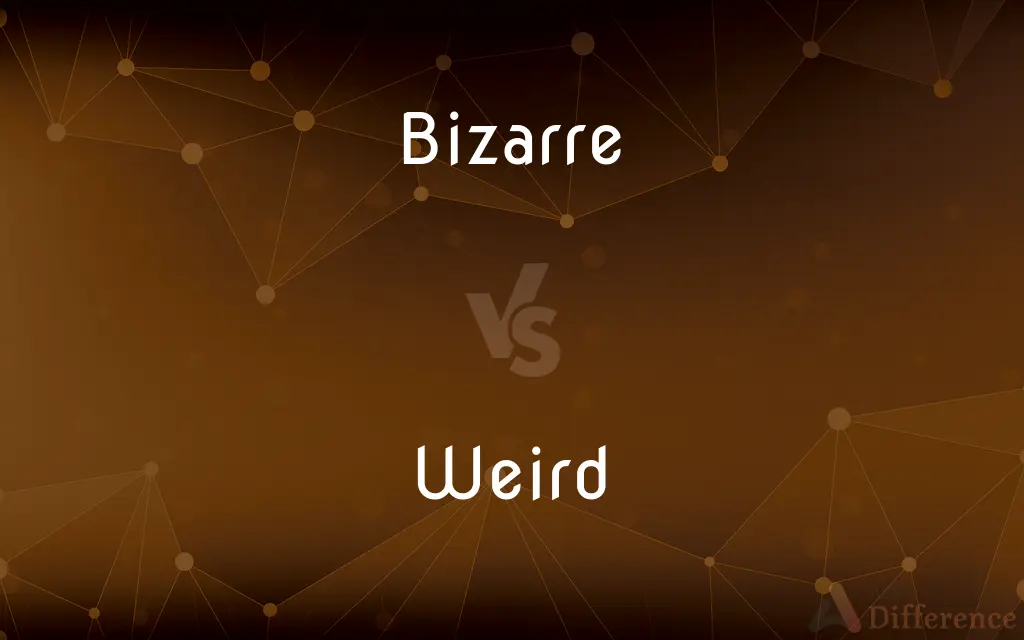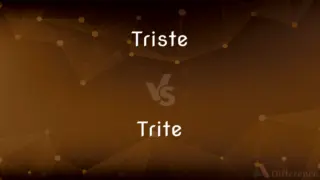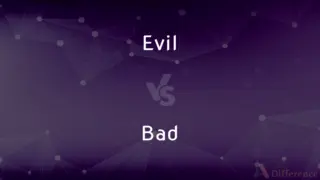Bizarre vs. Weird — What's the Difference?
Edited by Tayyaba Rehman — By Fiza Rafique — Updated on March 13, 2024
Bizarre emphasizes the strikingly unconventional or far-fetched nature of something. Weird conveys a sense of the unnatural or inexplicable, often invoking discomfort or fascination.

Difference Between Bizarre and Weird
Table of Contents
ADVERTISEMENT
Key Differences
Bizarre is used to describe things that are very unusual or strange in a way that might be intriguing or hard to understand. It suggests an element of surprise and deviation from the norm that can be shocking or fascinating. Weird, on the other hand, carries a connotation of something being not only unusual but also uncanny or unsettling. It often implies a deeper sense of mystery or otherworldliness, something that doesn't just deviate from the norm but may also challenge our understanding or comfort levels.
Bizarre often points to the eccentric or extraordinarily unconventional, highlighting aspects of novelty and peculiarity. This can apply to situations, behavior, and appearances that are out of the ordinary to the point of being amusing or intriguing. Weird, however, leans towards a sense of disquiet or discomfort, suggesting that something is not only unusual but may also evoke feelings of eeriness or being perturbed. This distinction is subtle yet significant when considering the emotional response elicited by each word.
In literature and popular culture, bizarre is frequently used to describe imaginative, outlandish scenarios or characters that are deliberately designed to astonish or entertain. Weird fiction, a genre unto itself, explores themes that are not only unusual but also incorporate elements of the supernatural, horror, or the inexplicable, pushing beyond mere eccentricity into realms that can be unsettling or deeply thought-provoking.
The usage of bizarre and weird can overlap in casual conversation, where both terms might be used interchangeably to express the unusual. However, bizarre might be chosen to emphasize the quirkiness or astonishing nature of something, while weird would be used to highlight its unsettling or incomprehensible aspects. The choice between bizarre and weird ultimately depends on the speaker's intent to convey either astonishment or unease.
Despite their differences, both terms serve to distance the subjects they describe from what is considered normal or typical. Whether something is labeled bizarre or weird often depends on the observer's perspective, cultural background, and personal thresholds for what is considered ordinary or acceptable. This subjectivity makes the distinction between bizarre and weird nuanced and context-dependent.
ADVERTISEMENT
Comparison Chart
Definition
Extremely unusual or strange.
Unnatural or supernatural; odd or uncanny.
Connotation
Eccentric, outlandish, fascinating.
Eerie, unsettling, inexplicable.
Emotional Response
Surprise, amusement, intrigue.
Discomfort, fascination, eeriness.
Common Usage
Describing odd scenarios or eccentric behaviors.
Describing unsettling or inexplicable phenomena.
Genre Association
Used broadly in various contexts.
Often associated with supernatural or horror themes.
Compare with Definitions
Bizarre
Extremely odd or fantastically unconventional.
The circus showcased a bizarre act that left the audience speechless.
Weird
Pertaining to the strange or inexplicable.
They shared weird stories around the campfire.
Bizarre
Unexpectedly quirky or peculiar.
She has a bizarre sense of humor that not everyone gets.
Weird
Odd or unusual in a way that invokes unease.
He has a weird vibe that makes people uneasy.
Bizarre
Strikingly out of the ordinary.
His fashion sense is bizarre but captivating.
Weird
Marked by a departure from the norm.
Her taste in music is really weird but interesting.
Bizarre
Fascinatingly strange.
They encountered a bizarre tradition while traveling.
Weird
Invoking a sense of mystery or otherworldliness.
The ancient ruins had a weird beauty to them.
Bizarre
Deviating drastically from the norm.
The bizarre landscape seemed like something out of a dream.
Weird
Suggesting something supernatural; unearthly.
There was a weird glow coming from the forest.
Bizarre
Very strange or unusual, especially in a striking or shocking way.
Weird
Strikingly odd or unusual, especially in an unsettling way; strange
He lives in a weird old house on a dark street. Your neighbor is said to be a little weird. I felt a little weird after drinking that tea.
Bizarre
Strangely unconventional; highly unusual and different from common experience, often in an extravagant, fantastic, and/or conspicuous way.
Weird
Suggestive of the supernatural
Weird stories about ghosts.
Bizarre
Odd in manner or appearance; fantastic; whimsical; extravagant; grotesque.
Weird
(Archaic)Of or relating to fate or the Fates.
Bizarre
Conspicuously or grossly unconventional or unusual;
Restaurants of bizarre design--one like a hat, another like a rabbit
Famed for his eccentric spelling
A freakish combination of styles
His off-the-wall antics
The outlandish clothes of teenagers
Outre and affected stage antics
Weird
Fate; destiny.
Weird
One's assigned lot or fortune, especially when evil.
Weird
Slang To experience or cause to experience an odd, unusual, and sometimes uneasy sensation. Often used with out.
Weird
Having an unusually strange character or behaviour.
There are lots of weird people in this place.
Weird
Deviating from the normal; bizarre.
It was quite weird to bump into all my ex-girlfriends on the same day.
Weird
(archaic) Of or pertaining to the Fates.
Weird
(archaic) Connected with fate or destiny; able to influence fate.
Weird
(archaic) Of or pertaining to witches or witchcraft; supernatural; unearthly; suggestive of witches, witchcraft, or unearthliness; wild; uncanny.
Weird
(archaic) Having supernatural or preternatural power.
There was a weird light shining above the hill.
Weird
(archaic) Fate; destiny; luck.
Weird
A prediction.
Weird
A spell or charm.
Weird
That which comes to pass; a fact.
Weird
The Fates (personified).
Weird
(informal) Weirdness.
Weird
(transitive) To destine; doom; change by witchcraft or sorcery.
Weird
(transitive) To warn solemnly; adjure.
Weird
(nonstandard) In a strange manner.
Weird
Fate; destiny; one of the Fates, or Norns; also, a prediction.
Weird
A spell or charm.
Weird
Of or pertaining to fate; concerned with destiny.
Weird
Of or pertaining to witchcraft; caused by, or suggesting, magical influence; supernatural; unearthly; wild; as, a weird appearance, look, sound, etc.
Myself too had weird seizures.
Those sweet, low tones, that seemed like a weird incantation.
The weird sisters, hand in hand,Posters of the sea and land.
Weird
To foretell the fate of; to predict; to destine to.
Weird
Fate personified; one of the three Weird Sisters
Weird
Suggesting the operation of supernatural influences;
An eldritch screech
The three weird sisters
Stumps...had uncanny shapes as of monstrous creatures
An unearthly light
He could hear the unearthly scream of some curlew piercing the din
Weird
Strikingly odd or unusual;
Some trick of the moonlight; some weird effect of shadow
Common Curiosities
Is "weird" always negative?
Not necessarily. While weird can imply something unsettling, it can also indicate fascination or interest in the unusual or mysterious.
Can something be both bizarre and weird?
Yes, something can be both bizarre and weird if it is extraordinarily unconventional and also evokes a sense of eeriness or otherworldliness.
What does bizarre mean?
Bizarre refers to something extremely unusual or strikingly unconventional.
How do cultural perceptions affect the interpretation of bizarre and weird?
Cultural background and personal experiences can significantly influence what is considered bizarre or weird, as norms and tolerances for the unusual vary widely across societies.
What makes an event bizarre?
An event is considered bizarre if it deviates significantly from what is typically expected or understood, often surprising or fascinating observers.
How do emotions play into the perception of bizarre and weird?
The emotional response to something bizarre or weird can vary from amusement and intrigue to discomfort and unease, affecting the individual's perception.
Is it possible for preferences to shift between finding something bizarre vs. weird?
Yes, as individuals are exposed to new experiences and perspectives, what they consider bizarre or weird can change.
How do bizarre and weird contribute to creativity?
Bizarre and weird elements can spark creativity by pushing boundaries and exploring the unconventional or the unknown.
What does weird mean?
Weird describes something that is unnatural, uncanny, or inexplicably odd.
How do bizarre and weird differ in usage?
Bizarre often emphasizes the amusingly or fascinatingly unusual, while weird focuses on the unsettling or inexplicable.
Why might someone prefer to use "bizarre" over "weird"?
Someone might use "bizarre" to convey astonishment or amusement at the unusual without the negative connotations of discomfort or eeriness that "weird" might imply.
Can the context change the meaning of bizarre and weird?
Yes, context plays a crucial role in how bizarre and weird are interpreted, with the surrounding circumstances and the speaker's intent shaping their meanings.
Can bizarre and weird be used positively?
Absolutely. Both terms can celebrate the uniqueness and originality of subjects, depending on the context and the speaker's attitude.
What role does subjectivity play in defining bizarre and weird?
Subjectivity is key, as personal experiences, cultural norms, and individual sensitivities greatly influence what one might categorize as bizarre or weird.
What kinds of stories are described as weird?
Stories that involve supernatural elements, unsettling mysteries, or inexplicable phenomena are often described as weird, especially in the genre of weird fiction.
Share Your Discovery

Previous Comparison
Triste vs. Trite
Next Comparison
Evil vs. BadAuthor Spotlight
Written by
Fiza RafiqueFiza Rafique is a skilled content writer at AskDifference.com, where she meticulously refines and enhances written pieces. Drawing from her vast editorial expertise, Fiza ensures clarity, accuracy, and precision in every article. Passionate about language, she continually seeks to elevate the quality of content for readers worldwide.
Edited by
Tayyaba RehmanTayyaba Rehman is a distinguished writer, currently serving as a primary contributor to askdifference.com. As a researcher in semantics and etymology, Tayyaba's passion for the complexity of languages and their distinctions has found a perfect home on the platform. Tayyaba delves into the intricacies of language, distinguishing between commonly confused words and phrases, thereby providing clarity for readers worldwide.














































